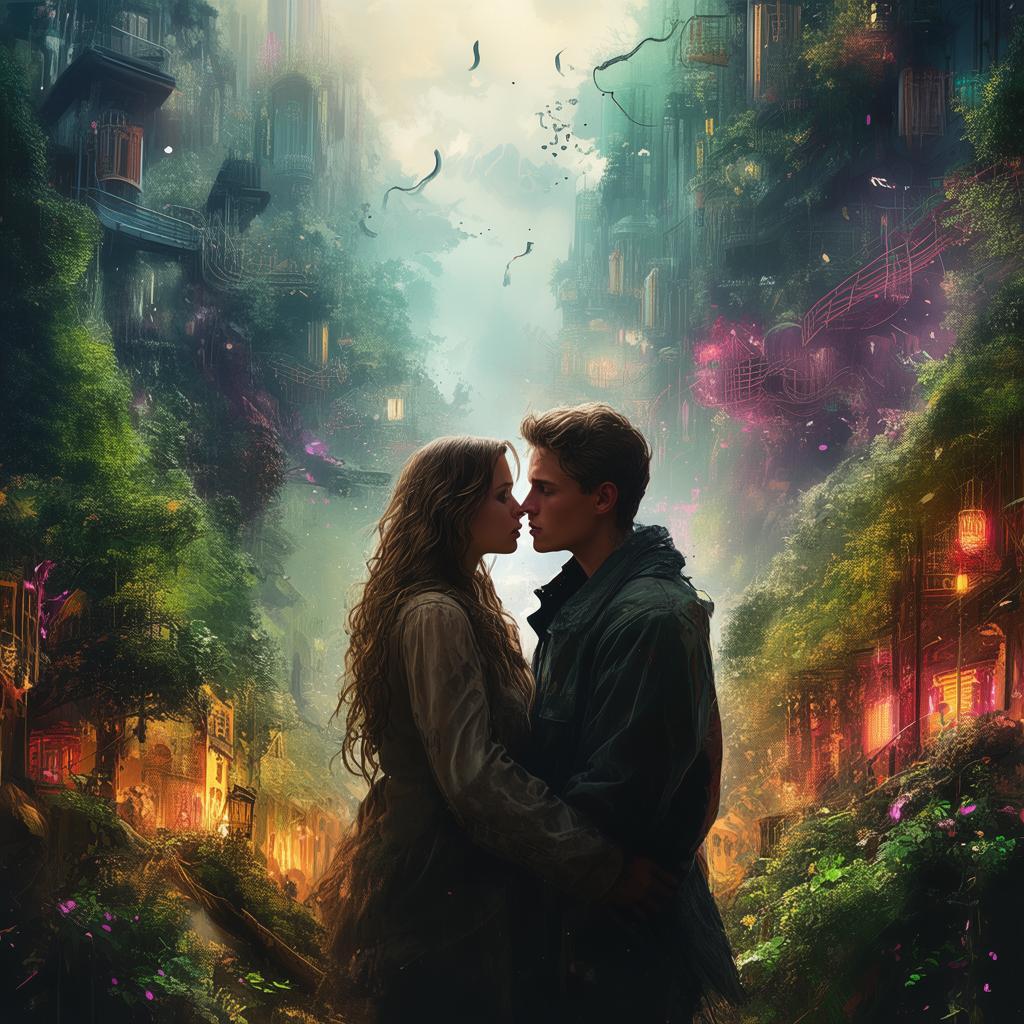Chronicles of Eternity: The Time-Traveling Poet's Unfolding Love
In the quiet hamlet of Willowbrook, amidst the whispering leaves of ancient oaks and the gentle flow of the brook, there lived a young man named Eamon. Eamon was not just a man of words, but a poet, whose verses danced on the pages of his leather-bound journal, a testament to his soul's longing. He had a gift, an uncanny ability to capture the essence of love in his poetry, a love that was yet to be discovered.
One crisp autumn evening, as the golden hues of sunset painted the sky, Eamon found himself wandering the cobblestone streets. His thoughts were a jumbled mess of dreams and reality, of a love that seemed forever out of reach. That's when he stumbled upon a small, quaint bookstore, its windows aglow with the warm light of the shopkeeper's lantern.
Inside, the air was thick with the scent of aged paper and the promise of forgotten stories. Eamon's gaze was immediately drawn to a shelf filled with books of poetry, each spine whispering tales of unspoken love. There, among the classics, he found a volume that seemed to call out to him. It was titled "The Time-Traveling Poet," and it was unlike any book he had ever seen. Its cover was embossed with intricate symbols that seemed to shimmer in the dim light.
Curiosity piqued, Eamon opened the book to the first page. The words inside were not just verses but promises, of a love that spanned lifetimes, of a heart that had beaten in parallel worlds. He realized then that he was not alone in his search for love; it was a journey written in the stars and the depths of his own soul.

The story unfolded as Eamon began to experience glimpses of another life, a life that was his in every detail but one—his love. In this parallel world, he was a poet named Caelan, and his love was named Isolde. Their love was a silent promise, a whisper in the wind, a dream that would not let him rest.
As the years passed, Eamon/Caelan's love for Isolde grew, a love that was as deep as the ocean and as wide as the sky. They shared their lives, their hopes, and their dreams, all through the lens of poetry. But fate, ever the cruel sculptor, had other plans. Isolde was to be married to a man she had never met, a man chosen by her family for wealth and position.
In the real world, Eamon struggled with the same fate. He had fallen in love with a woman named Eliza, whose eyes held the same fire as Isolde's, but whose heart was as unreachable as the stars. His poetry became his confidant, his way of reaching her, of telling her that she was the love he had been searching for all his life.
But the threads of fate were woven tightly. In the parallel world, Caelan's love for Isolde was met with a tragic ending. She was lost to him, her heart torn asunder by the weight of her duty. Caelan's grief was a storm that raged within him, a storm that mirrored Eamon's own.
The books of poetry, filled with the verses of both Caelan and Eamon, began to change. The symbols on the covers glowed brighter, the words seemed to move and shift, as if the very fabric of time was being rewritten. It was then that Eamon realized the true power of his poetry—it was not just a reflection of his love but a vessel through which their hearts could communicate.
He began to write with a new urgency, his words becoming the bridge between his world and Caelan's. In the verses, he spoke of Eliza, of the love that was his, and of the love that was not. He spoke of the pain and the joy, the hope and the despair, all in the hope that Isolde might hear his voice across the chasm of time.
And then, one fateful night, as the moon hung low in the sky, a storm raged over Willowbrook. The storm was not of wind and rain but of emotions, of love and loss, of hope and despair. In the midst of the storm, Eamon felt a presence, a familiar warmth that seemed to envelop him.
It was Isolde, walking through the pages of his poetry, her eyes brimming with tears, her heart filled with a newfound understanding. She saw her own life through Eamon's eyes, and in that moment, they understood the depth of their love, a love that transcended time and space.
Together, they spoke, their voices mingling in the silence of the storm. They shared their lives, their joys, and their sorrows, and in doing so, they found a way to heal the wounds of the past. Their love, once bound by fate, now flourished in the present, a love that was as timeless as the stars themselves.
The storm abated, and the dawn broke over Willowbrook, casting a new light on the lives of Eamon and Eliza, and Caelan and Isolde. Their love, once a whisper in the wind, now resonated through time, a testament to the power of love and the enduring nature of the human heart.
And so, as the years passed, the poets continued to write, their words a testament to the love that had brought them together. They wrote of joy, of sorrow, of hope, and of the enduring strength of the human spirit. And in their poetry, their love was preserved, a love that would endure through the ages, a love that was as timeless as the very verse they wrote.
✨ Original Statement ✨
All articles published on this website (including but not limited to text, images, videos, and other content) are original or authorized for reposting and are protected by relevant laws. Without the explicit written permission of this website, no individual or organization may copy, modify, repost, or use the content for commercial purposes.
If you need to quote or cooperate, please contact this site for authorization. We reserve the right to pursue legal responsibility for any unauthorized use.
Hereby declared.









